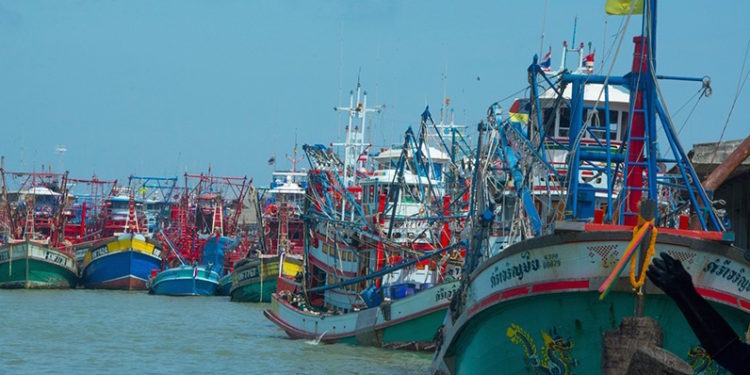A series of new measures and heavy penalties have been introduced as a package of of new regulation to deter illegal fishing activities and to monitor labour-related offences in overseas fishing operations by Thai fishing vessels.
A ban on transhipping has now been put in place and with Thai vessels monitored by VMS, suspicious activity can be monitored and vessels inspected when they return to port. In case of illicit transhipping, a vessel’s fishing licence can be revoked and a fine imposed.
A task force of officers from a number of agencies are now inspecting Thai-flagged fishing vessels operating in the Indian Ocean. The Director-General of the Department of Fisheries has ordered all vessels operating outside Thai waters, which did not previously report to one of the Port in – Port out Control Centres when departing out to return to port for inspection by 30 January 2016.
The inspection scheme has so far uncovered cases of infringements of related fisheries and labour laws, including logbook offences and the use of illegal migrant labour. Legal action is being taken against vessel owners found to have violated the laws.
Some harsh penalties have been introduced, and the owner of a fishing vessel of over 150gt fishing outside Thai waters without a fishing licence is liable to a fine of 20,000,000 to 30,000,000 baht (€500,000 – 750,000) or five times the value of the catch, whichever amount is higher. The use of illegal seamen without a valid seaman’s book or work permit is liable to a fine of 400,000-800,000 baht (€10,000-20,000 euros) per seaman.
Observers are now required on Thai-flagged fishing vessel operating overseas. The first batch of 20 observers completed their training at the end of last year and are expected to be deployed to selected vessels operating in the Indian Ocean and elsewhere in early 2016.
The Department of Fisheries has set up a Fisheries Monitoring Operation Centre (FMOC) equipped with Vessel Monitoring System (VMS) technology. This is already operational, allowing the authorities to monitor the activities of approximately 2000 vessels of 60gt and over, with automatic alarms in place to detect suspicious behaviour. The authorities are seeking technical cooperation with international experts from the US and the EU to further enhance their monitoring capabilities, especially in risk and behavioural analysis of fishing vessels.
All these measures are part of the Thai government’s efforts to reform Thailand’s fisheries management in line with international standards. The latest moves followed a comprehensive revamping of the fisheries legislation and the adoption of the Fisheries Management Plan and the National Plan of Action to Prevent, Deter and Eliminate IUU Fishing (NPOA-IUU). Inspections of seafood processing plants are being carried out, with a number of factory owners already charged with violations of labour and related laws.









